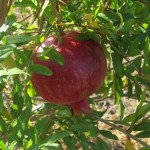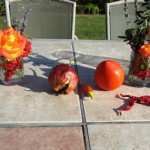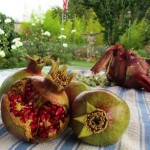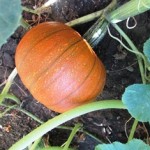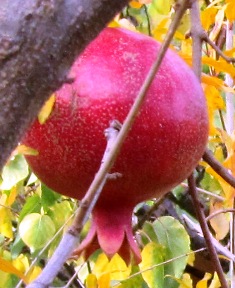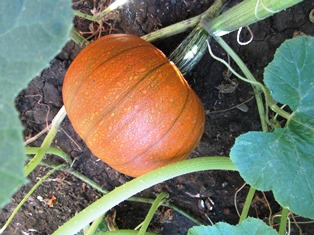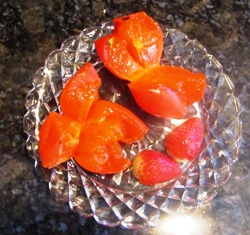Simple Gratitude for the Harvest
It’s nearly Thanksgiving and our Henny Penny Farmette continues to bring forth delicious, organically grown edibles for our table for which we feel truly grateful.
We give thanks, too, for neighbors like Dan and Annie. This past Sunday, Annie carted to our house a box of persimmons and bags of apples and pomegranates. We harvested all our apples last month so her timing was great. While we have persimmons and pomegranates hanging on the trees in our small orchard, many are not yet ripe enough to pick.
Last month, I froze cubes of butternut squash in freezer bags and readied pumpkin flesh for pie. While picking a few ripe persimmons recently, I noticed that we’re sharing them with a visitor who seems to sneak in and munch during the night. I’m thinking the culprit could be a raccoon, opossum, skunk, squirrel, fox, or a gaggle of wild turkeys that seem to make an annual pilgrimage through our area.
The two main types of persimmons grown on our farmette are Fuyu and Hachiya. The Fuyu is rather squat-looking and Hachiya has an elongated shape. Both take on a bright orange color in the fall. When fully ripe, Fuyu is sweet and crunchy like an apple whereas the Hachiya is soft like jelly. Though commonly thought of as fruits, persimmon and pomegranate are technically berries.
Fuyu persimmons can be peeled, sliced, and eaten fresh, roasted, or tossed into salads. They add a vibrant splash of orange to a winter salad that could include slices of citrus and pear tossed with greens,walnuts, pomegranate seeds, and goat cheese.
Pomegranates are ripe when their leathery outer covering turns red and begins to crack. Inside each pomegranate is white tissue separating compartments of ruby-red seeds called arils.
The seeds are high in antioxidants that reduce inflammation and free radical damage. Though they are messy to remove, the pomegranate seeds are healthy and nutritious additions to any diet.
To preserve pomegranate seeds, freeze them on a baking sheet. Once frozen, slip the seeds into freezer bags and return to the freezer. The seeds can be kept frozen for months.
Pumpkins come in a variety of sizes and types. Personally, I prefer the sugar pumpkins for recipes calling for pumpkin as an ingredient.
This week as we prepare for the big feasting day of Thanksgiving, lots of cooks are already baking pumpkin pies. Many will use canned pumpkin as a shortcut to their pie preparation but pumpkin filling made from scratch is especially delicious.
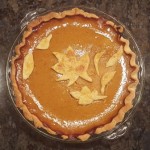
Our pumpkin pie features leaves of pie dough, brushed with egg, and sprinkled with sugar before baking
The old fashioned way to make pumpkin pie from scratch is to use fresh, organic pumpkin puree from the produce that you’ve grown in your garden. The process to make a pie takes longer because first the pumpkin must be peeled, seeded, and cut into manageable pieces and then cooked down. Then just follow your favorite pumpkin pie recipe.
_________________________________________________________________
Taking care of yourself is one of the most important things you can do over your lifetime and it starts with healthy ingredients and fresh produce.
My newest self-help wellness book is THE SELF-CARE PLANNER, A Weekly Guide to Prioritize You.
My books are available for purchase through online and traditional bookstores everywhere. Buy The Self-Care Planner and other titles offered by my publisher, Simon & Schuster online. Visit my author’s page at https://www.simonandschuster.com/authors/Meera-Lester/2137649823

It’s never too late to get healthy and live a richer, fuller, and more meaningful life. Self care is not selfish but rather an act of love.
YOU NEED THIS BOOK. WE ALL DO.
Buy it now from:
https://www.simonandschuster.com/books/The-Self-Care-Planner/Meera-Lester/9781507211649
Check out more recipes and tips for healthy country living in my Henny Penny Farmette series of cozy mysteries (Kensington Publishing, NY).
Pomegranates and Persimmons Are Ripening Now
The pomegranates are turning from green to a deep red as they should be. It’s the middle of September after all. Some have split open, exposing the red seeds inside the fruits. My neighbor says it’s because of uneven watering. These trees don’t need much water and, I admit, I’ve been lax about running the hose on them.
The seeds are luscious, bursting with sweet-tart flavors. Eat the seeds raw or toss them into a citrus salad with fresh greens, oranges, sweet grapefruit sections, kiwi slices, tangerine sections, crunchy apple and pear slices, and sugared pecans.
While I wait for tomatoes (yes, an old heirloom variety of tomatoes with lots of vines that ripen late season) and the French pumpkins to ripen, I’ve noticed that the persimmons have turned a bright orange, but are still quite firm to the touch.
I planted hachyia persimmons instead of fuyu simply because I like them better. The fuyu persimmons are like small, flat apples. They are crunchy and perfect in salads. The hachyia variety can be eaten fresh or incorporated into baked goods.
If not completely ripened, the hachiya are tart–mouth-puckeringly so. But when they are ripened to perfection, they become soft and sensual like custard. To me, there’s nothing quite like those fruits.
Hasten the ripening of both fuyu and hachyia persimmons in the kitchen in a paper bag. Always look for bright glossy color and a heavy weight to the fruit when selecting fruit to eat or bake.
The hachyia variety adds a pumpkinlike flavor to bake goods as well as additional moisture. The hachyia has earned the moniker of “the baking persimmon.” Try using them in cakes, puddings, breads, and cookies.
Think of pomegranates and persimmons as early autumns special treats. The pumpkins and apples will follow. Then for us Northern California gardeners, the work starts in earnest for preparing beds for our cool season gardens.
 Facebook
Facebook Goodreads
Goodreads LinkedIn
LinkedIn Meera Lester
Meera Lester Twitter
Twitter




